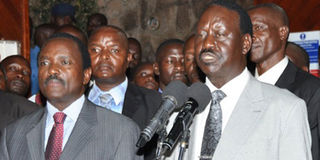Breaking News: At least 10 feared to have drowned in Makueni river
Raila seeks orders for audit of poll IT system

PHOTO | STEPHEN MUDIARI Prime Minister Raila Odinga and Vice-President Kalonzo Musyoka at the Bomas of Kenya after chairing the Nairobi County Cord leaders’ forum on March 19, 2013. Also present was Ford-Kenya leader Moses Wetang’ula and Nairobi County Governor-elect Evans Kidero.
What you need to know:
- Premier’s lawyer says information is linked to main case against Uhuru win
Prime Minister Raila Odinga has filed a fresh petition at the Supreme Court seeking orders to compel the electoral commission to allow a forensic audit of its IT system.
The PM filed the application under certificate of urgency, claiming the audit would be crucial in the main petition he has filed challenging the declaration of Uhuru Kenyatta as winner of the March 4 presidential elections.
Mr Odinga, through lawyer George Oraro argues that the Independent Electoral and Boundaries Commission (IEBC) has been giving conflicting and confusing reasons for the failure of the electronic system.
“IEBC has given conflicting reasons for failure of the Electronic Voter Identification, Biometric Voter Registration, Results Transmission System and Results Presentation System) and other electronic systems. There is urgent need for parties to place empirical forensic evidence to help the Supreme Court in making a decision,” said Mr Oraro.
He therefore sought an order for the preservation of all Media Access Control and Internet Protocol addresses for all mobile devices used for electronic voter identification at each of the 33,400 polling stations across the country.
He also wants a preservation of all the Satellite Mobile Telephone handsets used for results transmission, SIM cards, laptops, desktop computers, and all servers on which the electronic data transfer for IEBC occurred.
Mr Odinga further seeks an order for the commission to disclose confidentially to the Supreme Court a catalogue of the names of users and passwords assigned to all users at each of the IEBC offices, places of operation and all the 33,400 polling stations.
“The commission should also produce all receipts and invoices for each of the hardware or software materials they bought to conduct electronic and manual transfer of results,” said Mr Oraro.
Mr Oraro said the Supreme Court needed to be informed of the real reasons for the failure of the electronic voter transmission and its impact on the outcome of the presidential elections to enable the judges reach an informed decision over the dispute in the presidential elections.
The application is scheduled to be heard this morning when the six Supreme Court judges meet for the first time for a mention of the three petitions filed challenging the outcome of the presidential elections.
Mr Oraro said they were forced to seek the information due to the electoral commission’s alleged failure to fulfil a promise it made to all political parties that the electronic system would be secure and free from manipulation.




